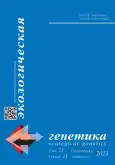The transformation and genome editing of Pisum sativum: protocols and their modifications
- Authors: Tvorogova V.E.1, Potsenkovskaia E.A.2, Efremova E.P.1, Kozlov N.V.1, Simonova V.Y.2, Krasnoperova E.Y.1, Konstantinov Z.S.2, Yakovleva D.V.1, Artemiuk A.M.1, Lutova L.A.1
-
Affiliations:
- Saint Petersburg State University
- Sirius University
- Issue: Vol 21 (2023): Спецвыпуск
- Pages: 32-33
- Section: Genetically modified organism. The Нistory, Achivements, Social and Environmental Riscs
- Submitted: 15.08.2023
- Accepted: 31.08.2023
- Published: 04.12.2023
- URL: https://journals.eco-vector.com/ecolgenet/article/view/567891
- DOI: https://doi.org/10.17816/ecogen567891
- ID: 567891
Cite item
Full Text
Abstract
Pea (Pisum sativum) is an important agricultural crop and a model object in various fields of plant research. At the same time, the genetic modification of pea is still a difficult task, which, apparently, is associated with its low ability to regenerate. There are a lot of different pea transformation protocols, however, for most of them, the transformation efficiency, i.e. the number of transgenic plants per explant, is extremely low. In addition, none of the protocols known to us has demonstrated itself to be universal, i.e. suitable for all varieties and lines of peas. We searched for studies on the transformation and regeneration of peas and systematized the data obtained. The resulting database made it possible to identify the most effective protocols for the transformation and regeneration of P. sativum, as well as to analyze statistically the general features of the methods used, such as the source of the explant, the composition of the culture media, the duration of cultivation, and so on. We assume that our system for the analysis of publications devoted to in vitro cell cultures can also be used for similar data on other plant species.
This research was supported by the Sirius University of Science and Technology project: PBB-RND-2243.
Keywords
Full Text
Pea (Pisum sativum) is an important agricultural crop and a model object in various fields of plant research. At the same time, the genetic modification of pea is still a difficult task, which, apparently, is associated with its low ability to regenerate. There are a lot of different pea transformation protocols, however, for most of them, the transformation efficiency, i.e. the number of transgenic plants per explant, is extremely low. In addition, none of the protocols known to us has demonstrated itself to be universal, i.e. suitable for all varieties and lines of peas. We searched for studies on the transformation and regeneration of peas and systematized the data obtained. The resulting database made it possible to identify the most effective protocols for the transformation and regeneration of P. sativum, as well as to analyze statistically the general features of the methods used, such as the source of the explant, the composition of the culture media, the duration of cultivation, and so on. We assume that our system for the analysis of publications devoted to in vitro cell cultures can also be used for similar data on other plant species.
This research was supported by the Sirius University of Science and Technology project: PBB-RND-2243.
About the authors
Varvara E. Tvorogova
Saint Petersburg State University
Email: krubaza@mail.ru
ORCID iD: 0000-0002-0549-1457
phd, senior researcher, department of genetics and biotechnology
Russian Federation, Saint PetersburgElina A. Potsenkovskaia
Sirius University
Email: epots556@gmail.com
ORCID iD: 0000-0002-5045-2641
specialist in plant biology and biotechnology
Russian Federation, SochiElena P. Efremova
Saint Petersburg State University
Email: elenaefr95@gmail.com
ORCID iD: 0000-0002-2565-1155
student in biology, department of genetics and biotechnology
Russian Federation, Saint PetersburgNikolai V. Kozlov
Saint Petersburg State University
Email: bionkbio@gmail.com
student, department of genetics and biotechnology
Russian Federation, Saint PetersburgVeronika Y. Simonova
Sirius University
Email: nikasimonova14@gmail.com
ORCID iD: 0000-0002-9037-4684
student
Russian Federation, SochiElizaveta Y. Krasnoperova
Saint Petersburg State University
Email: st064840@student.spbu.ru
student in biology, department of genetics and biotechnology
Russian Federation, Saint PetersburgZakhar S. Konstantinov
Sirius University
Email: zakhar.konstantinov25@gmail.com
ORCID iD: 0000-0002-0825-9418
student
Russian Federation, SochiDaria V. Yakovleva
Saint Petersburg State University
Email: enginequs@gmail.com
Russian Federation, Saint Petersburg
Anastasiya M. Artemiuk
Saint Petersburg State University
Email: nastyaart2004@gmail.com
Russian Federation, Saint Petersburg
Ludmila A. Lutova
Saint Petersburg State University
Author for correspondence.
Email: la.lutova@gmail.com
ORCID iD: 0000-0001-6125-0757
dr. sci. (biol.), professor
Russian Federation, Saint PetersburgReferences
Supplementary files










